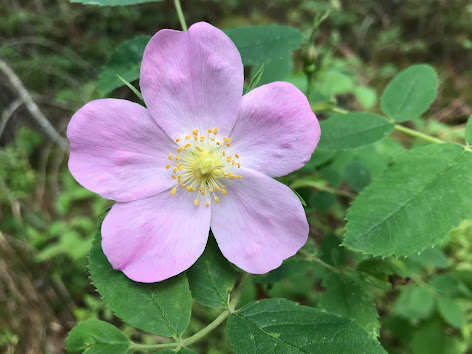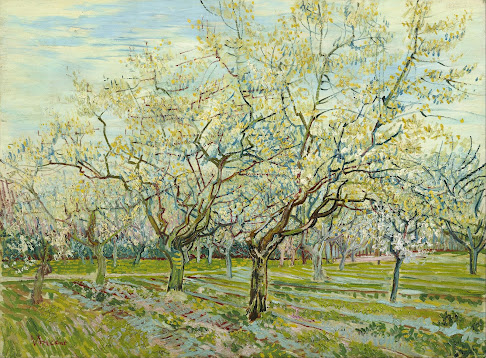And here is the Wannaskan Almanac with Word-Wednesday for June 12, 2024, the twenty-fourth Wednesday of the year, the thirteenth Wednesday of spring, the second Wednesday of June, and the one-hundred-sixty-fourth day of the year, with two-hundred two days remaining.
Wannaska Phenology Update for June 12, 2024
Coming Up Roses
Rosa blanda is now flowering in Wannaska. Also known as Smooth Wild Rose, it is the most common of Minnesota's native roses and found throughout the state, differentiated from Prairie Rose (Rosa arkansana) and Prickly Wild Rose (Rosa acicularis) by its lack of prickles on newer stems and branches. One or more flowers bloom at the tips of new lateral branches of older woody stems, 2 to 3 inches across, pink to deep rose colored with five broad, rounded petals with wavy edges, sometimes notched at the tip. Numerous yellow stamens surround the shorter styli in the center. The globular berry like fruits (rose hips) form later, turning bright red in late summer.
June 12 Fickle Pickle Wednesday Menu Special: Potato Dumpling
June 12 Nordhem Wednesday Lunch: Updated daily, occasionally.
Earth/Moon Almanac for June 12, 2024
Sunrise: 5:20am; Sunset: 9:28pm; 44 seconds more daylight today
Moonrise: 11:34am; Moonset: 1:22am, crescent, 29% illuminated.
Temperature Almanac for June 12, 2024
Average Record Today
High 71 93 80
Low 50 32 55
from The Vision of Sir Laufal
by Maxine Kumin
And what is so rare as a day in June?
Then, if ever, come perfect days;
Then Heaven tries the earth if it be in tune,
And over it softly her warm ear lays:
Whether we look, or whether we listen,
We hear life murmur, or see it glisten;
Every clod feels a stir of might,
An instinct within it that reaches and towers,
And, groping blindly above it for light,
Climbs to a soul in grass and flowers;
The flush of life may well be seen
Thrilling back over hills and valleys;
The cowslip startles in meadows green,
The buttercup catches the sun in its chalice,
And there's never a leaf nor a blade too mean
To be some happy creature's palace;
The little bird sits at his door in the sun,
Atilt like a blossom among the leaves,
And lets his illumined being o'errun
With the deluge of summer it receives;
His mate feels the eggs beneath her wings,
And the heart in her dumb breast flutters and sings;
He sings to the wide world, and she to her nest,—
In the nice ear of Nature which song is the best?
June 12 Celebrations from National Day Calendar
- National Peanut Butter Cookie Day
- National Jerky Day
- National Loving Day
- National Red Rose Day
- World Day Against Child Labor
June 12 Word Pun
Sven’s doing crunches twice daily, now:
Captain in the morning; Nestle in the afternoon.
June 12 Word Riddle
What’s the difference between a literalist and a kleptomaniac?*
June 12 The Devil’s Dictionary Word-Pram
RANK, n. Relative elevation in the scale of human worth.
He held at court a rank so high
That other noblemen asked why.
"Because," 'twas answered, "others lack
His skill to scratch the royal back."
—Aramis Jukes
June 12 Etymology Word of the Week
week
/wēk/ n., a period of seven days, from Old English wucu, wice, etc., from Proto-Germanic wikō(n)- (source also of Old Norse vika, Old Frisian wike, Middle Dutch weke, Old High German wecha, German woche), probably originally with the sense of "a turning" or "succession" (compare Gothic wikon "in the course of," Old Norse vika "sea-mile," originally "change of oar," Old English wican "yield, give way"), from Proto-Indo-European root weik- (2) "to bend, to wind." The vowel sound seems to have been uncertain in Old and Middle English and -e-, -i-, -o-, -u-, -y-, and various diphthongs are attested for it.
"Meaning primarily 'change, alteration,' the word may once have denoted some earlier time division, such as the 'change of moon, half month,' ... but there is no positive evidence of this" [Buck]. There also is no evidence of a native Germanic week before contact with the Romans. The seven-day week is ancient, probably originating from the 28-day lunar cycle, divisible into four periods of seven days, at the end of each of which the moon enters a new phase. This would have been reinforced during the spread of Christianity by the ancient Jewish seven-day week.
As a Roman astrological convention it was borrowed by other European peoples; the Germanic tribes substituting their own deities for those of the Romans, without regard to planets. The Coligny calendar suggests a Celtic division of the month into halves; the regular Greek division of the month was into three decades; and the Romans also had a market week of nine days. Phrase a week, as in eight days a week recorded by 1540s and again by The Beatles in December 1964.
June 12 Historic Events, Literary or Otherwise, from On This Day
- 746 Dedication of the Mat House, public meeting house, at the Maya City of Copán under ruler Smoke Monkey.
- 1458 Magdalen College, Oxford founded by William Waynflete, Bishop of Winchester.
- 1776 Virginia adopts Declaration of Rights.
- 1942 Anne Frank gets her diary as a birthday present in Amsterdam.
June 12 Author/Artist/Character Birthdays, from On This Day
- 1468 Juan del Encina, Spanish author and composer.
- 1802 Harriet Martineau, British journalist,
- 1827 Johanna Spyri, Swiss children's book author.
- 1842 Rikard Nordraak, Norwegian composer.
- 1857 Achille Simonetti, Italian violinist and composer.
- 1874 Willem Landré, Dutch composer.
- 1876 Narciso Garay, Panamanian composer.
- 1878 James Oliver Curwood, American journalist and writer.
- 1890 Egon Schiele, Austrian painter and graphic artist.
- 1892 Djuna Barnes, American author.
- 1892 John Donald Robb, American composer.
- 1897 Alexandre Tansman, Polish composer.
- 1899 Anni Albers, German-American textile artist and printmaker.
- 1900 Amadeo Roldán, Cuban composer and violinist.
- 1903 Emmett Hardy, American jazz musician.
- 1904 Eino Roiha, Finnish composer.
- 1906 Sandro Penna, Italian poet.
- 1908 Marina Semyonova, Russian ballerina.
- 1909 Mansel Treharne Thomas, Welsh composer.
- 1910 Bill Naughton [William John Francis Naughton], Irish playwright.
- 1921 James Archibald Houston, Canadian author.
- 1923 Marta Pan, Hungarian-French sculptor.
- 1927 Henry Slesar, American writer and playwright.
- 1929 Anne Frank, Dutch diarist.
- 1929 Brigid Brophy, British novelist.
- 1929 Jameel Jalibi, Pakistani writer.
- 1930 Hans Koetsier, Dutch sculptor.
- 1930 Adolf Born, Czech painter.
- 1932 Rona Jaffe, American novelist.
- 1968 Peadar Ó Guilín, Irish author.
- 1968 Marty McFly, Back to the Future character
- 1974 Amanda Brunker, Irish author.
Words-I-Looked-Up-This-Week Writer's Challenge
Write a story or pram from the following words:
- bateau: /ba-TŌ/, n., a light flat-bottomed riverboat used in eastern and central North America.
- camogie: /kə-MŌ-gē/ n., a team sport similar to hurling played with camogs by women in Ireland.
- créche: /kreSH/ n., a model or tableau representing the scene of Jesus Christ's birth, displayed in homes or public places at Christmas; a nursery where babies and young children are cared for during the working day.
- fluctisonant: /fluk-TIS-uh-nuhnt/ adj., sounding like rolling ocean waves; having the sound of rolling waves.
- jizya: /JIZ-yə/ n., a capitation tax formerly levied on non-Muslims by an Islamic state.
- kilim: /kə-LĒM/ n., a flat-woven carpet or rug made in Turkey, Kurdistan, and neighboring areas.
- pelerine: /PEL-ə-rēn/ n., a woman's cape of lace or silk with pointed ends at the center front, popular in the 19th century.
- raglan: /RAG-lən/ adj., having or denoting sleeves that continue in one piece up to the neck of a garment, without a shoulder seam.
- shill: /SHil/ n., an accomplice of a hawker, gambler, or swindler who acts as an enthusiastic customer to entice or encourage others; v., act or work as a shill.
- tohubohu: /TŌ-hü¦Bō-hü/ n., chaos.
June 12, 2024 Word-Wednesday Feature
Me Talk Good
locution: /lō-KYo͞o-SHən/ n., a word or phrase, especially with regard to style or idiom; a person's style of speech; an utterance regarded in terms of its intrinsic meaning or reference, as distinct from its function or purpose in context, from early 15th century, from Latin locutionem (nominative locutio) "a speaking, speech, discourse; way of speaking," noun of action from past-participle stem of loqui "to speak," from Proto-Indo-European root tolkw- "to speak." Cookie Monster, Sven, George W. Bush, Kermit The Frog, and you all have unique verbal locutionary fingerprints that family and friends would recognize even if your voice was blindfolded.
Beyond our personal words, phrases, and idioms, we each use combinations of more specialized forms of locution, depending on the context and our peculiar goals:
allocution: /al-ə-KYo͞o-sh(ə)n/ n., a formal speech giving advice or a warning.
circumlocution: /sər-kəm-lə-KYo͞o-sh(ə)n/ n., the use of many words where fewer would do, especially in a deliberate attempt to be vague or evasive.
elocution: /el-ə-KYo͞o-sh(ə)n/ n., the skill of clear and expressive speech, especially of distinct pronunciation and articulation.
illocution: /il-ə-KYo͞o-sh(ə)n/ n., an act of speaking or writing which in itself effects or constitutes the intended action, e.g. ordering, warning, or promising.
perlocution: /pər-lə-KYo͞o-sh(ə)n/ n., an act of speaking or writing which has an action as its aim but which in itself does not effect or constitute the action, for example persuading or convincing.
From A Year with Rilke, June 12 Entry
The Watchman in the Vineyards, from Book of Hours I, 58
Just as the watchman in the vineyards
has a hut, keeps vigil there,
I am that hut, Lord.
And I am night, Lord, within your night.
Wine garden, meadow, apple orchard,
field that no springtime forgets,
fig tree that yields a thousand figs
though rooted in ground as hard as marble:
fragrance exudes from your rounding branches.
You never ask if I am keeping watch.
Fearless, dissolved in juices,
your depths rise quietly around me.
The White Orchard
by Vincent van Gogh
Be better than yesterday,
learn a new word today,
try to stay out of trouble - at least until tomorrow,
and write when you have the time.
*A literalist takes things literally; a kleptomaniac takes things, literally.



ReplyDeleteMon bateau, s'il vous plait, we're headed to sea
It's the inaugural Olympics for the game carmogie
We've shown the sport's great, we've paid our jizya
They can't put us off with their fa la la la
Our jerseys of reglan we've carefully stowed, plus our team pelerines
Sewn in our team's colors, a bright Kelly green
With the kids in their créches we're busy as ants
As we row from the shore to the roar fluctisonant
I say I'm no shill, but the other teams- we'll kill 'em
There'll be tohubohu as we place the kibosh, I mean kilim
Bateau: a boat
Camogie: women's Irish field hockey
Jizya: a tax
Raglan: seamlessness, of a garment
Pelerine: a woman's cape
Créche: place of Jesus' birth
Fluctisonant: having the sound of ocean waves
Shill: the accomplice of a swindler
Tohubohu: chaos
Kibosh: cloth put on the face of the departed at an Irish wake
Kilim: a rug
Imperatives
ReplyDeleteGift a bateau
to a team of camogies.
Urge them to rest their sticks,
exchange the sweat of raglans
for the grace of a pelerine.
Invite the shill
to roll up his kilim,
cancel the jizya,
reach his arms
upwards
to the sky.
Leave the turmoil of the tohubohu
for the comfort of the creche,
the freedom of a fluctisonant flow.
One and all,
feel that shush of wind
on top of water.